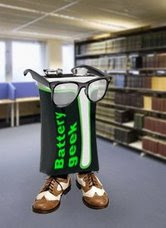Wednesday, April 9, 2008
Why use Rechargeable Lithium Ion batteries?
Li-ion (lithium ion) batteries use lithium compounds which are much more stable than the elemental lithium used in non rechargeable lithium batteries. A lithium battery should never be recharged while lithium-ion batteries are designed to be recharged hundreds of times. Rechargeable Lithium Ion batteries have a higher energy density than most other types of rechargeables. This means that for their size or weight they can store more energy than other rechargeable batteries. They also operate at higher voltages than other rechargeables, typically about 3.7 volts for lithium-ion vs. 1.2 volts for NiMH or NiCd. This means a single cell can often be used rather than multiple NiMH or NiCd cells. Lithium-ion batteries also have a lower self discharge rate than other types of rechargeable batteries. This means that once they are charged they will retain their charge for a longer time than other types of rechargeable batteries. NiMH and NiCd batteries can lose anywhere from 1-5% of their charge per day, (depending on the storage temperature) even if they are not installed in a device. Lithium-ion batteries will retain most of their charge even after months of storage.










